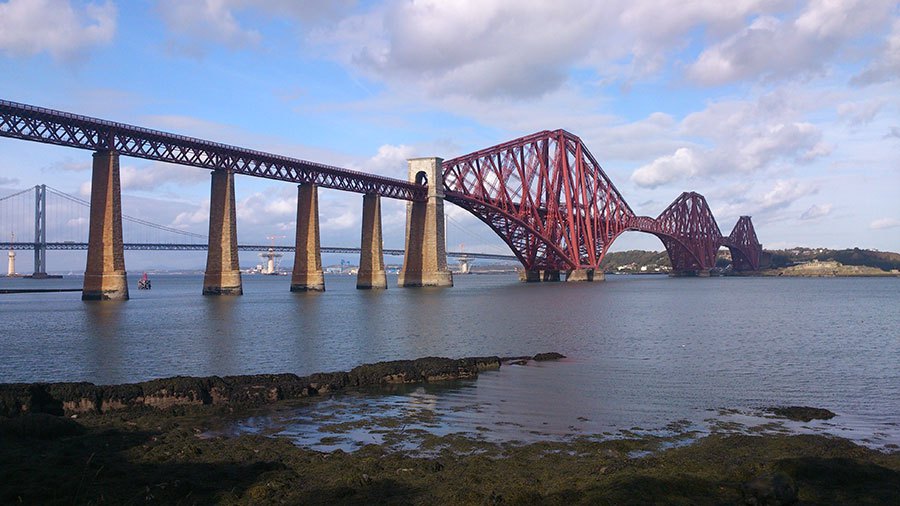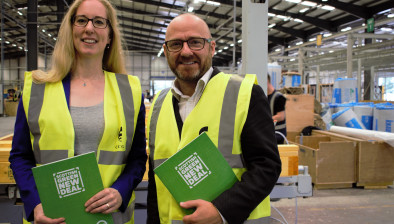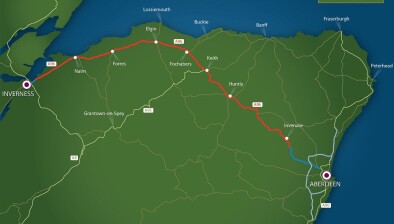Firth of Forth tunnel at heart of Scottish Greens’ proposed £22bn rail revolution
The Scottish Greens have called for the creation of a new cross Forth rail tunnel as part of a £22 billion rail revolution proposed by the party to build a modern, zero-carbon network.

Estimated to cost between £4bn-6bn, the project would see a new underground station in Leith and transform journeys between Edinburgh, and Fife and up the east coast to Dundee and Aberdeen and north to Perth and Inverness.
In addition, the party’s Rail for All programme plans for the construction of a new overground terminal station at St Enoch’s (Argyle Street) in Glasgow and full electrification of the inter-city network by 2030 to allow the current rolling-stock to be replaced with modern high-performance electric trains.
The plans also include:
- Replacing outdated rural rolling stock with electric battery-powered trains.
- Ensuring where realistically possible every town with a population of over 5,000 is connected to the rail network.
- Upgrading the Highland Main Line, the Far North Line, West Highland Line and the Ayr – Stranraer Line, reopening the Dunfermline to Alloa route and opening new stations across the country.
- Introducing tramtrains which can run on streets and on traditional rails for cross-city transit for instance in Aberdeen between Ellon and Banchory.
- Redoubling congested single-track lines including the Milngavie and Balloch branches.
- Significantly boosting capacity to allow a more efficient and sustainable shift of freight from road to rail.
The Greens are also proposing that one publicly owned rail operator is formed, by re-integrating ScotRail and Network Rail Scotland.
The party’s transport spokesperson John Finnie said the Rail for All programme should be a central part of Scotland’s green recovery from the Covid-19 crisis, creating thousands of jobs whilst delivering infrastructure that is essential to tackling the climate emergency and supporting long-term economic prosperity.
He added: “The Scottish Greens are proposing the biggest rail investment programme Scotland has ever seen. Our fully-costed £22 billion plan would transform Scotland’s railway, building a modern, zero-carbon network that is affordable and accessible to all.
“Rail for All is about making rail the natural choice for every journey. Whether you’re commuting, travelling for business or leisure.
“The investment would also be a central component of Scotland’s green recovery from the Covid-19 crisis, creating thousands of quality, unionised jobs whilst delivering the infrastructure so necessary to tackle the climate emergency.
“Scotland’s rail network has suffered from long term systemic under investment, with governments of all stripes favouring roads. While some improvements have been made in recent years the network north of the central belt has been largely neglected. As someone who, prior to the pandemic restrictions, regularly travelled by rail between the north and the central belt I know all too well just how infuriating the current setup can be.
“The fact that many journeys take longer in 2021 than they did in Victorian times shows just how constrained Scotland’s railway has become. But we must not accept this decline. We can enjoy, and we must demand, the environmental, economic and quality of life benefits of a comprehensively modernised rail network.
“The public and political support for an investment led green recovery from the current crisis is the ideal opportunity to deliver this overdue modernisation. Investing in a modern Scottish railway must be a key pillar of the green economic recovery. We know that it will create jobs and provide a legacy for communities across the country.
“The key principle of the Rail for All programme is to make the rail network accessible to everyone. Our aim is, as far as realistically possible, for every town with a population of over 5,000 to be connected to the network. That would see a host of new stations developed across the country, with existing lines upgraded, and previously closed lines given a new lease of life.
“The current setup focuses connections with the capital through Haymarket, creating a major bottleneck that affects the whole network. Our proposed Forth tunnel would ramp up capacity on the east coast and provide a fast and direct connection between Edinburgh and Fife, onto Perth, Inverness, Dundee and Aberdeen, reducing journey times and massively increasing capacity on the network, including to the west.
“The construction of a new city centre overground station at St Enoch’s in Glasgow would link into the revived, upgraded and electrified city union line to create significant extra capacity in Scotland’s biggest city. Constructing a new station near the former St Enoch’s station site would significantly boost capacity in the city and signify the rebirth of Scotland’s modern railway.”
The Rail for All programme is based on an expert report commissioned from Deltix Transport Consulting by John Finnie MSP.
David Spaven, the principal of Deltix Transport Consulting, said: “Based on our long experience in the industry – and taking account of international best practice – we put together a programme focused not just on rail’s crucial contribution to decarbonisation, but also on the wide range of other environmental, social and economic benefits it offers. The great thing about Rail for All is that it serves the whole of Scotland and is both achievable and a game-changer – and can deliver many of the benefits in the first decade.”
Commenting on the biggest single project in the plan, Deltix associate David Prescott, who co-wrote the report, added: “At a stroke the Forth Tunnel can transform the geography of Scotland, just as the Forth Bridge did 130 years ago and the Forth Road Bridge nearly 60 years ago. It would substantially cut the distance between Edinburgh and east Fife, Dundee, Aberdeen Perth and Inverness, whilst also putting Leith at the heart of the Scottish rail network. The Forth Tunnel would give this generation of Scottish engineers the opportunity to continue the strong traditions of their illustrious predecessors – creating transformational infrastructure for the nation.”















